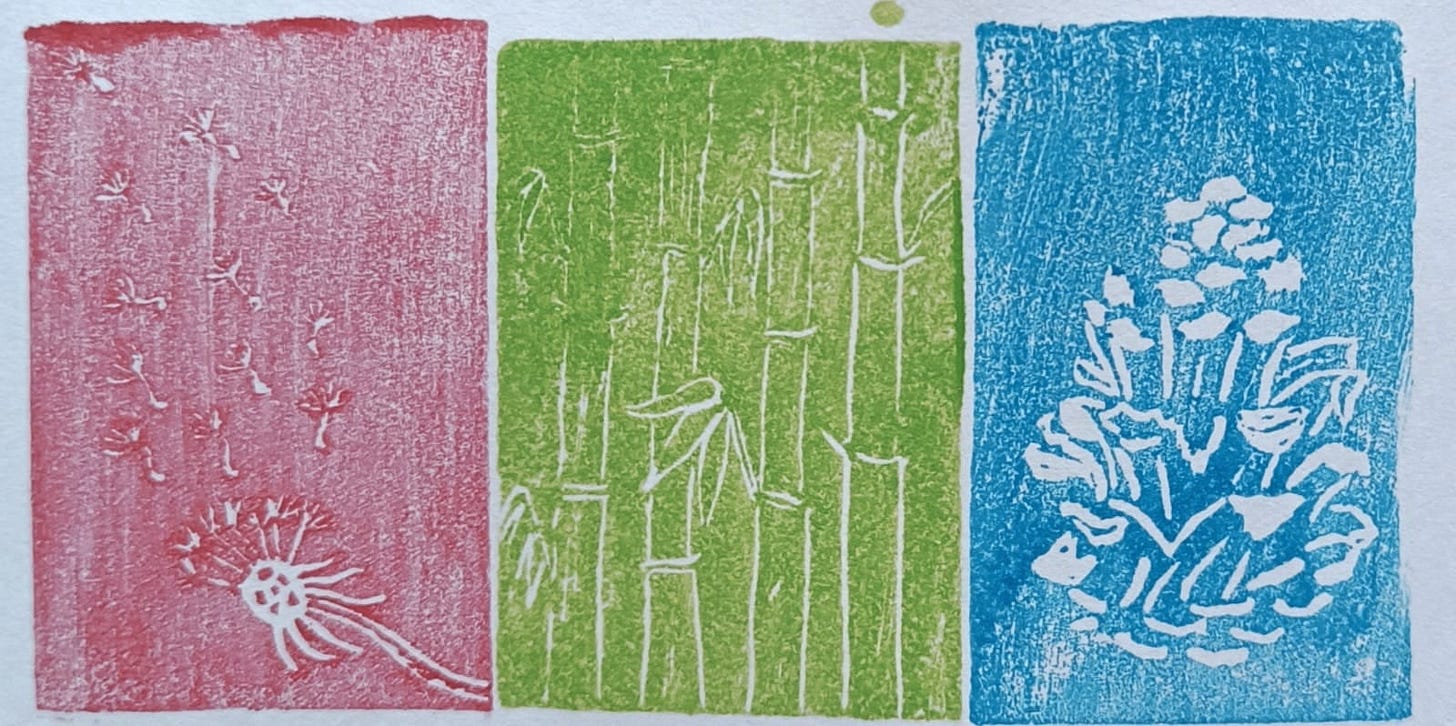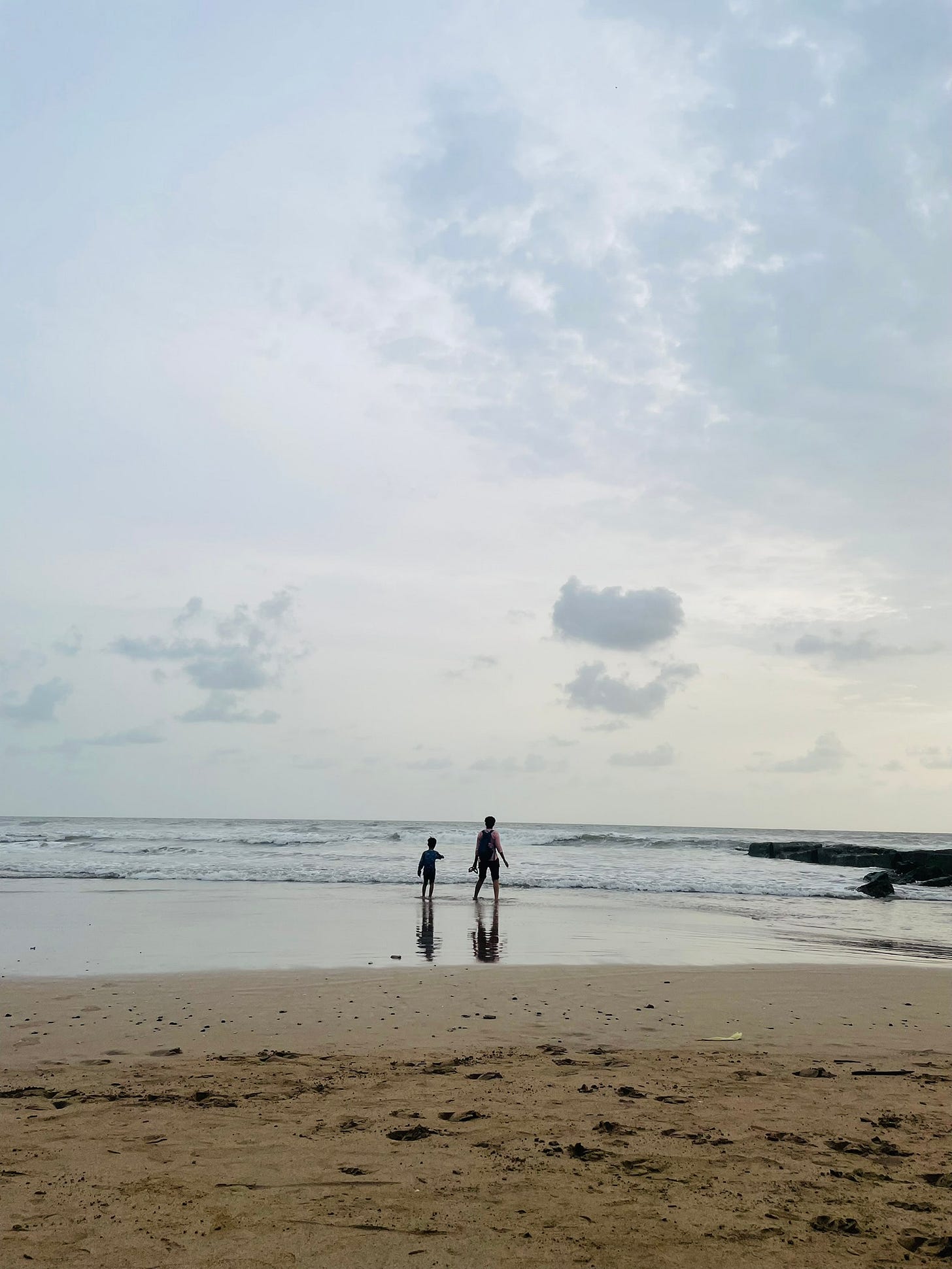How to steal a summer
From mangoes and cool sea breezes to heatwave alerts and AC rooms—how climate change stole the season I loved
This flash essay is part of a collaborative, constrained-writing challenge undertaken by some members of the Bangalore Substack Writers Group. This month, each of us examined the concept of ‘SEASONS’. At the bottom of this snippet, you’ll find links to other essays by fellow writers.

Summer. What does this mean to you?
To me, Summer meant fantasizing about mangoes, then bringing home the first batch and watching them ripen day by day, waiting for that perfect first bite.
Summer meant spending entire days loafing around outdoors with cousins, with no collateral damage other than stubborn tan lines.
Summer meant beach time. It meant early evening trips to Shivaji Park, where sandcastles were built and smashed, before ending the day with a colourful gola dripping down your fingers. It meant glorious sunsets and staring at the sun till it finally dropped into the ocean. It meant Goa vacations where you played on the beach all day and enjoyed fried fish at the shacks.
Summer meant late-night walks along the Worli seafront, followed by an ice cream at Haji Ali juice center, the salty sea breeze cooling your face as you licked the melting scoop.
Summer meant trips to my native place in Konkan where the days were hot but you could jump into the well or stream to cool down and sleep outdoors looking at the stars.
Summer meant long power cuts. But even they had a silver lining: the doors would be kept open for the breeze to flow, and play time for us kids could spill into the 2–5 pm slot—otherwise sacred siesta time for adults.
Summer was never just a calendar period. Summer was an emotion.
But what does the calendar stretch that meant summer in my childhood (March–May along the western coast, April–June in the northern plains) mean today?
Today, it means heatwave alerts and warnings about heat strokes. It means staying cooped up in AC rooms all day. It means worrying about sunscreen and water intake rather than sandcastles and gola stains. It means days that are too hot for outdoor work to be safe. It means circulating pdfs that explain how to stay safe during a heatwave.
One can still have mangoes but the charm is long lost. They’re available almost year-round, stripped of their seasonal excitement.
Children today can’t imagine playing outdoors all day. If lucky, they may get to go out for a couple of hours in that golden window around the sunset, confined to AC rooms the rest of the day.
Going to the beach even in the evening is unimaginable. In fact, Dubai has started keeping its beaches open 24X7 because the days are too hot for people to come out to the beach. May not be too long before we see similar sights in India.
Night-time temperatures no longer drop, and those midnight Worli sea face walks are out of question.
There is not an iota of romance left in the power cuts, because even half an hour without a cooling device is probably putting you at risk of a heat stroke. If that were to happen and one was stuck in a place without a power back-up, the only “respite” left is a mall.
I refuse to call this summer.
What astonishes me most is the speed of this transformation. I’m 34, and the summers I recall with such tenderness are from the 90s and early 2000s. In just two decades, the season has become unrecognizable.
And the heartbreak comes from knowing that we didn’t just lose the carefree summers of childhood, we lost summer itself.
And this is what I hate most about climate change - it’s taking away from me things that I have loved dearly. And one of its many casualties is dear Summer.
But maybe we can get it back. Or at least try to.
Yes, Climate change is a global problem and can like a Superobject, something one can’t win against. But while global warming is part of the problem, the extreme heat we are experiencing in our cities is also greatly intensified by the ‘Heat island effect’.
If you want to understand why summers are getting so hot, you can read an Explainer I wrote earlier.
And there’s a lot of things one can do to address the global problem as well as the local impacts. There is of course disproportionate power in government and industry actions to address this challenge, but individual action matters too. For individual actions related to addressing climate change at a global level you may find inspiration in a Climate change bucket list I made at the beginning of 2025.
Efforts that can reduce the temperature at a localised level include a better tree cover, more water bodies, and building design that can cool the interiors and ensure better ventilation.
So the choice is ours. How many more things that we love will we lose to climate change before we chose to act?
Other essays from this collaborative exercise
Seasons of Change by Devayani Khare, Geosophy
Seasons of Change by Aarti Krishnakumar
Bengaluru Weather: Our Greatest Love Affair by Vikram Chandrashekar, Vikram’s Substack
#10 On Seasons By Siddhesh Raut, Shana, Ded Shana
The deck of Seasons by Siddarth RG, Siddarth’s Newsletter
Festival Season by Rakhi Kurup , Rakhi’s Substack
One Long Summer Afternoon by Mihir Chate, Mihir's Substack
In Glory of Monsoon and Love by Aryan Kavan Gowda, Wanderings of a Wanderer
Over and over by Richa Vadini Singh, Here’s What I Think
Seasons will come and go by Priyanka Sacheti, A Home for Homeless Thoughts
A rain song that makes you wonder what season it is by Eshna Benegal, The Deep Cut
A Season for Murder by Gowri N Kishore, About Murder, She Wrote.
What I Remember by Avinash Shenoy, Off the walls
Phobjikha by Ayush, Ayush’s Substack
Feels like Spring by Shaili, Lit Curry



